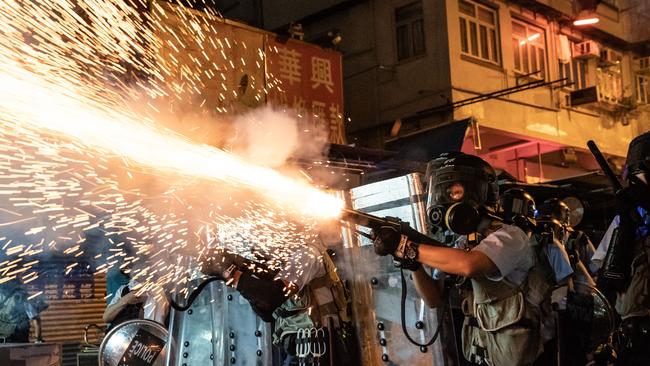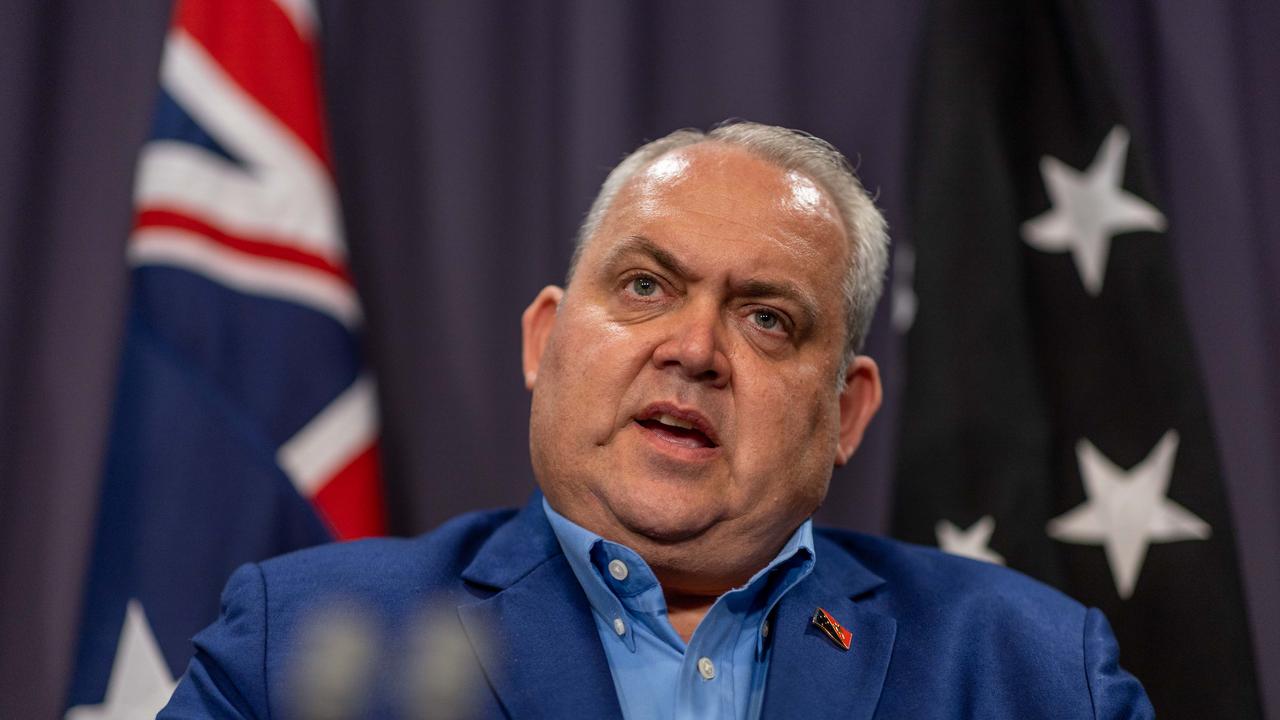Hong Kong protests: Morrison backs Trump’s calls for peaceful solution
Scott Morrison backs Donald Trump’s calls for a peaceful solution to the HK crisis, urging Beijing to respect protesters’ rights.

Scott Morrison has backed Donald Trump’s calls for a solution to the crisis in Hong Kong, and urged Chinese authorities to respect the right of protesters to have their say peacefully.
Speaking in Tuvalu, where he is attending the Pacific Island Forum, the Prime Minister said he was worried about the worsening situation in the autonomous region, amid growing warnings by China that it is preparing to crackdown on protesters.
“This is a very sensitive situation,” Mr Morrison said.
“It’s a very concerning situation, and anything I would say would be only to encourage a de-escalation of the situation in Hong Kong, and for those that are protesting to do so peacefully, and for that to be respected.
“That’s what we have to focus on right now. And I welcome what I believe are constructive contributions from others who are seeking the same thing - President Trump and others.
“We just simply want to see the tensions de-escalate there, and so people can just go along about their peaceful lives.”
MORE: Hong Kong, Beijing backers rally supporters
Mr Morrison said Australians considering visiting Hong Kong should read Australia’s travel advice, which was recently upgraded to “exercise a high degree of caution” and warns of the possibility of flash protests and random attacks on protesters.
The US President has urged his Chinese counterpart to meet with protesters in Hong Kong demanding democratic reforms, saying he had “zero doubt” that President Xi could “humanely solve the Hong Kong problem”.
He also linked a possible US-China trade deal to a resolution of the crisis, saying on Twitter: “Of course China wants to make a deal. Let them work humanely with Hong Kong first!”
China’s Ambassador to the UK Liu Xiaoming issued stark warning to protesters overnight, saying Beijing was prepared to “swiftly quell unrest” if demonstrations continued.
“Their moves are severe and violent offences, and already show signs of terrorism,” Mr Liu said.
Beijing: We won’t sit on our hands
Last night Beijing gave its starkest warning yet of military action against pro-democracy protesters in Hong Kong, with China’s ambassador to London telling reporters authorities were willing to send in forces.
“The central government will not sit on its hands and watch,” Liu Xiaoming said last night (AEST), repeating charges that some protesters had shown “signs of terrorism.”
“We have enough solutions and enough power within the limits of (the) Basic Law to quell any unrest swiftly,” Mr Liu said.
“The central government of China will never allow a few violent offenders to drag Hong Kong down a dangerous road, down a dangerous abyss.”
Mr Liu also warned against what he claimed was western backing for the protesters. “Evidence shows that the situation in Hong Kong would not have escalated without the interference of foreign forces,” he said.
Mr Liu’s comments came as Donald Trump urged China President Xi Jinping to meet with the protesters after weeks of unrest and a two day closure of the Hong Kong airport.
Mr Trump tweeted: “If President Xi would meet directly and personally with the protesters, there would be a happy and enlightened ending to the Hong Kong problem”.
Mr Trump’s statement marked a shift in tone regarding the situation in Hong Kong and for the first time linked the administration’s fragile trade talks with Beijing to the protests.
Earlier a tweet that said enigmatically “Personal meeting?” had been misconstrued by global media as a suggestion he wanted to meet with President Xi over the growing crisis.
But China appeared increasingly bellicose, with the Friday edition of the influential state-controlled Global Times lashing out at what Beijing has already described America’s “black hand” of interference.
Warning that China had the option to “forcefully intervene”, the paper said: “If Hong Kong cannot restore the rule of law on its own and the riots intensify, it’s imperative then for the central government to take direct actions based on the Basic Law.”
Appearing to slap down Mr Trump’s attempt to link the protests to the US-China trade war, it added: “The US would rather mess Hong Kong up, using Hong Kong as a new bargaining chip in its strategic competition with China”.
In the editorial, headed: Futile for Washington to play the HK card, the newspaperadded that the troops amassing in the city of Shenzhen, on the Hong Kong border, was a “clear warning.”
It said the situation would not be a repeat of the bloody crackdown in Tiananmen Square; but warned: “China is much stronger and more mature (than it was 30 years ago), and its ability to manage complex situations has been greatly enhanced”.
Yesterday, on the other side of the bridge linking Hong Kong to the mainland members of the paramilitary People’s Armed Police conducted a fourth day of crowd control practice, widely seen as a warning to protesters.
More than 100 paramilitary vehicles filled the car parks of the stadium in Shenzhen where exercises were held.
Trade deal tied to Hong Kong
he administration had quietly urged US officials to maintain a measured response on Hong Kong, over fears that criticism of Beijing could derail US-China trade talks. Mr Trump had called for a restrained response to the protests to avoid rousing tensions with Beijing, the officials said.
On Wednesday, the US President described the Hong Kong crisis only as a “tricky situation.”
Yesterday, Commerce Secretary Wilbur Ross denied that trade negotiations with Beijing were tempering the administration’s response to Hong Kong.
“I don’t know if we would have done anything different in the past. What would we do? Invade Hong Kong?” Mr Ross told CNBC.
“The President has made clear that he is watching very carefully what’s happening … This is an internal matter.”
Then Mr Trump began a series of tweets with reassurances to US consumers that his trade war with China wouldn’t affect them adversely. He then made a rare unsolicited mention of Hong Kong.
“It actually helps China more than us, but will be reciprocated,” he wrote. “Millions of jobs are being lost in China to other non-tariffed countries. Thousands of companies are leaving. Of course China wants to make a deal. Let them work humanely with Hong Kong first!”
Hong Kong is facing its worst political turmoil since the former British colony was returned to Chinese rule in 1997, with marches drawing massive crowds initially demanding a full withdrawal of an extradition bill.
The US-China trade fight and the Hong Kong crisis are overlapping in Washington as more US politicians voice concerns over Beijing’s policy towards Hong Kong.
Republican senator Marco Rubio, in a tweet yesterday, described Beijing’s stance on Hong Kong as “a cautionary lesson for anyone thinking about any deal with them”. Senator Rubio has introduced a bipartisan bill that threatens to revoke Hong Kong’s special trade status with the US if Beijing intervenes in the city, a vital trade gateway.
Republican senator Lindsey Graham, in a tweet of support for the protests on Wednesday, referenced the 1989 Tiananmen Square massacre in Beijing. “30 years after Tiananmen Square all Americans stand with the peaceful protesters in Hong Kong,” he wrote. Tiananmen Square remains a sensitive issue in China, where any mention or remembrances of the crackdown are censored. “These protests highlight the moral authority of their demands for Freedom and Democracy. This is becoming a defining moment for US-China relations,” Senator Graham wrote.
Republican Senate majority leader Mitch McConnell described the protests as a fight to preserve Hong Kong’s freedom and warned Beijing against any military action in the city. “Any violent crackdown would be completely unacceptable,” he tweeted. “As I have said on the Senate floor: The world is watching.”
Several Democrats had criticised Mr Trump for not taking a more forceful stance in support of the pro-democracy protesters.
“If America does not speak out for human rights in China because of commercial interests, we lose all moral authority to speak out elsewhere, ” House of Representatives Speaker Nancy Pelosi said.
Beijing has reacted angrily to the comments, citing them as further evidence of US involvement in China’s internal affairs and saying that the US politicians “whitewashed violent crimes as a struggle for human rights and freedom.” “Hong Kong affairs are entirely China’s internal affairs, and you are neither entitled nor qualified to wantonly comment on them,” Chinese Foreign Ministry spokeswoman Hua Chunying told reporters this week, during a regularly scheduled news conference. “Mind your own business.”
With The Wall Street Journal




To join the conversation, please log in. Don't have an account? Register
Join the conversation, you are commenting as Logout